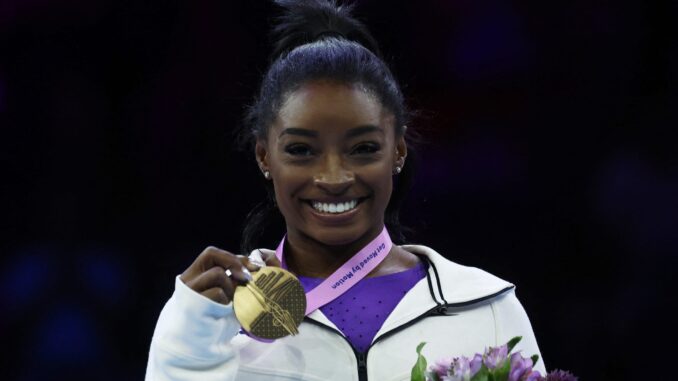
MyKayla Skinner, the Olympic silver medal gymnast, is asking the International Olympic Committee to move forward with a full ban on transgender athletes in women’s sports. She reacted after reports said the IOC was getting close to blocking male-born athletes from taking part in the women’s category at future Olympic Games. These reports came out earlier this week and quickly sparked debate.
MyKayla Skinner shared her views in an op-ed she wrote for Fox News on Monday. She said she wants to protect young girls who train and dream about competing one day. Her comments came soon after an IOC spokesperson said on Tuesday that the “working group is continuing its discussions” and that more information will be given later. Right now, no final decision has been made by the IOC.
Simone Biles, one of the most decorated gymnasts in history, finds herself once again at the center of controversy. This time, the drama has reignited after her former teammate MyKayla Skinner publicly called for the International Olympic Committee (IOC) to ban transgender athletes from women’s sports. To raise the stakes even higher, Donald Trump has entered the fray, adding political firepower to a debate that is deeply entrenched in both sports ethics and the culture wars. What started as an internal gymnastics feud has become a global discussion on fairness, identity, and the future of competitive athletics.
1. The Origins of the Feud
1.1 Skinner’s Accusations Against Biles
According to Skinner, she “endured being belittled, dismissed, and ostracized” by Biles during their time on the U.S. gymnastics team. She claims that Biles’ platform was used in ways that felt personally demeaning, suggesting a deeper rift than just competition-level tension.
1.2 The Riley Gaines Spark
The feud escalated after Biles criticized Riley Gaines, a former swimmer and conservative activist, for her anti-transgender remarks. Skinner sided with Gaines and said Biles’ comments weren’t just about policy but about personal attacks — a move that brought long-buried issues to light.
2. Skinner’s Push to the IOC
2.1 A Public Plea for Policy Change
Skinner isn’t just airing dirty laundry. She’s using her voice to demand a structural change: calling on the IOC to restrict or ban transgender athletes assigned male at birth from competing in women’s events. Her argument is framed around fairness and safety, especially for biological women in high-stakes sports.
2.2 Aligning with XX-XY Athletics
Skinner’s advocacy isn’t in isolation. She has officially joined XX-XY Athletics, a group known for its anti-trans sports stance. In her own words, she wants to be a “voice for elite female athletes” who she believes are being silenced in the debate.
3. Biles’ Response and Apology
3.1 When Words Go Too Far
After a blistering social media back-and-forth, Biles issued a public apology, saying she “got personal” with Gaines and acknowledging how emotional the issue is. She emphasized that her frustration is with the system—not individual people.
3.2 Reaffirming Her Beliefs
In her apology, Biles made it clear she still believes in both competitive equity and inclusion. She called for thoughtful policy changes in sport rather than attacks on individual athletes, especially vulnerable young people.
4. Skinner’s Mental and Emotional Fallout
4.1 Cyberbullying and Real Threats
Skinner hasn’t stayed quiet. She has publicly opened up about receiving death threats and extreme online harassment after the feud reignited. In a plea for empathy, she urged Biles to “ask your followers to stop” the onslaught.
4.2 Finding Strength in Advocacy
She has also discussed how difficult it was for her to speak out. By aligning with XX-XY Athletics and rallying for a stricter IOC stance, Skinner is turning her pain into purpose — positioning herself as a defender of what she calls “biological reality.”
5. Trump Joins the Debate
5.1 Political Backing for Skinner’s Cause
Donald Trump has publicly lent his support to a transgender ban in women’s sports. This isn’t just passive commentary: his backing gives Skinner’s message political credibility and big media visibility.
5.2 The International Implications
Trump has reportedly urged the U.S. government to pressure the IOC to revise its transgender athlete rules, arguing that eligibility should be based on “sex, not gender identity.” Given his global influence — and his history with the Olympics — his intervention could reshape how international sports institutions handle gender policy moving forward.
6. Why This Feud Matters
6.1 Beyond Personal Drama
This isn’t just a blow-up between two gymnasts — it’s a flashpoint in a much larger, global conversation. The outcome could influence future Olympic policies, how athletes are categorized, and what fairness means in modern sports.
6.2 The Intersection of Sports and Identity
At its heart, this clash raises deep questions: What does it mean to be a “woman” in competitive athletics? How do we balance inclusion and fairness? And who gets to decide?
6.3 A Test for the IOC
The IOC is watching. Skinner’s call isn’t just emotional — it’s a policy challenge. If her push gains traction, it could force the Committee to confront not only the science of gender but also the evolving political and cultural landscape.

7. Public Reaction and Social Media
7.1 Supporters Rally Around Skinner
Many of Skinner’s supporters see her as brave for speaking out. Her alignment with Gaines and the larger “Save Women’s Sports” movement has generated significant buzz, especially among conservative circles.
7.2 Critics Call Out the Bully Narrative
Others argue that this feud is about power and platform. Critics suggest Skinner is leveraging political alliances to frame her narrative, while some question if targeting Biles is about more than just policy.
8. The Broader Transgender Athlete Debate
8.1 Science, Fairness, and Ethics
Trans athlete participation isn’t a new issue — but as more high-level athletes weigh in, the pressure on institutions like the IOC increases. The debate combines biology, sports science, human rights, and governance.
8.2 Policies in Flux
Sports organizations around the world are already grappling with how to regulate transgender participation. Skinner’s public demand could accelerate policy shifts, and not just in gymnastics.
8.3 Culture Wars Cross Over into Athletics
This isn’t purely a sports issue: it’s political, social, and deeply personal. When public figures like Trump get involved, the lines blur even more between athletic governance and ideological battles.
9. What’s Next?
-
IOC Response: Will the IOC engage with Skinner’s proposal, or will it stick with more inclusive policies?
-
Media Fallout: Expect more headlines, interviews, and social-media blowback as this issue continues to unfold.
-
Influence on Future Games: As we edge closer to major events like the 2028 Los Angeles Olympics, decisions made now could shape which athletes compete — and under what rules.
-
Athlete Voices: More gymnasts and elite athletes may follow Skinner’s lead, forcing federations and committees to reckon with their policies.
-
Political Pressure: With Trump and other power players invested, any policy change will likely have both global sports and geopolitical implications.
Conclusion
The resurfacing feud between Simone Biles and MyKayla Skinner is no longer just personal drama. It has evolved into a full-blown global conversation about transgender inclusion in sports — one that involves not only elite gymnasts, but international governing bodies like the IOC and political figures like Donald Trump. Skinner’s demand for a transgender ban raises uncomfortable but essential questions about fairness, identity, and what it means to compete on a level playing field. Meanwhile, Biles’ apology underscores the emotional weight and complexity of the issue.
As this story unfolds, it could redefine the future of women’s sports. Will the IOC take action? Will public opinion shift? And perhaps most importantly, how will athletes who feel caught in the middle — whether for or against — find their voices? One thing’s clear: this isn’t just about a feud. It’s about the very heart of sport in the 21st century.